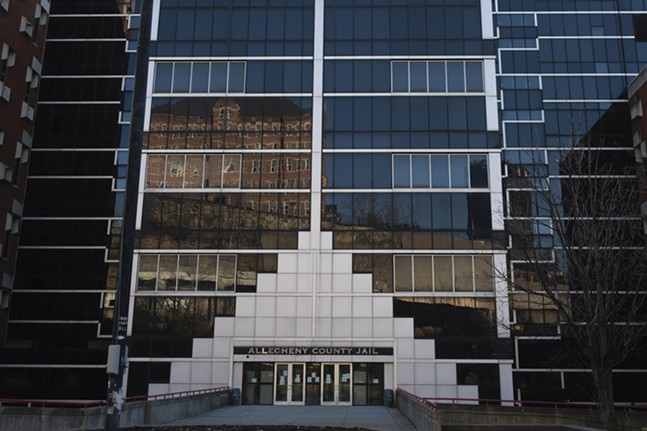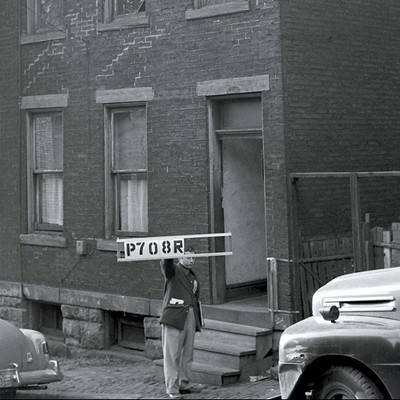
Getting diagnosed with HIV in the late 1980s — back when the prognosis was a near death sentence — also instilled in Fluker a depression that would exist alongside the virus for the next 30 years of his life.
When Fluker went into the Allegheny County Jail on a shoplifting charge last year with several active prescriptions, including for a once-daily HIV medication and an antidepressant, he says there was a period when he wasn't able to access any of it.
"These are important medications that people should get," Fluker says. "When a person is suicidal, and you're not giving them their medication, then that causes the person to harm themselves."
Fluker is one of several inmates and activists who say medication access issues plague the Allegheny County Jail, with inefficient distribution and inconsistent dosing damaging inmates' health and, in some cases, endangering their lives. Legal advocates say the jail's faulty medical care infrastructure may amount to a series of ongoing constitutional violations.
Jesse Geleynse, the public information officer for the jail, told Pittsburgh City Paper in an email that the jail has no comment on the claims by former and current inmates as the Health Insurance Portability and Accountability Act (HIPAA) prevents the jail from discussing or releasing any personal information.
Fluker says he served roughly five months at the jail before being booked into alternative housing. A diagnosed schizophrenic, he says he rejected medication for two months in that period with the belief that the jail was trying to poison him.
In alternative housing — where he stayed for less than a week before being rebooked at the jail following an altercation — a doctor convinced Fluker to get back on his medication for several health conditions, including HIV, depression, and high blood pressure. Back at the jail, Fluker says he filed multiple prescription requests to no avail.
For two weeks, Fluker says he asked for Biktarvy, his once-a-day HIV medication, and never got it. For one month, Fluker says he requested his previously prescribed clonidine, a high-blood pressure medication, and never got it. He says for his entire 181 days of incarceration, he never received his antidepressant, mirtazapine.
Sarah McBeth, a doctor and the medical director of Allies for Health + Wellbeing, notes that, although it wasn't acutely dangerous for Fluker to be off his HIV medication for two weeks, month-long periods without it can critically increase the amounts of the virus in a person’s bloodstream.
"We recognize that these medications are life-sustaining treatments, and we emphasize to patients the importance of taking those medications every day over the long term to protect their immune system and, therefore, avoid life-threatening infections that can result from AIDS," McBeth tells CP.
As for the clonidine, McBeth says doctors are typically hesitant to prescribe the heavy-duty medication because it can cause major spikes in blood pressure if a patient misses a dose. She says in Fluker's case, being unable to access his medication for a month could have been potentially dangerous.
Muhammad Ali Nasir, an incarceration reform activist also known by his emcee name, MAN-E, says through conversations with people held at the jail — and by way of what he saw when he was held there as a juvenile in 2005, and for protesting the killing of George Floyd Jr. in 2020 — stories like Fluker's are far too familiar.
"Most people are waiting for days to be seen when they request medical care," Nasir, a recent appointee to the Allegheny County Jail Oversight Board, says. "Some people may come in with prescriptions from their doctors on the outside and will not receive the medication that they need."

A current inmate at the jail (CP has chosen to keep her anonymous) told CP she didn't receive any of her previously prescribed medication for days after her arrest and likened the jail's intake process to "being thrown in a dog kennel." She says this was only the start of a long-lasting medication drought to come for several of her prescriptions.
Her medical records confirm that, for nearly eight months between April 2023 and December 2023, she did not receive her previously prescribed gabapentin to treat the pain resulting from diagnosed neuropathy. Back on the oral medication since January of this year, she says she receives it at inconsistent times and often only two out of her three prescribed daily doses.
McBeth characterized neuropathy as a painful condition that can lead to a lack of function due to numbness in the hands or feet. Not receiving pain medication can worsen its effects, and receiving it at inconsistent times can leave gaps of unmedicated pain or result in overmedication if it's administered too soon after the last dose, McBeth says.
Geleynse told CP in an email that the jail automatically gives inmates any medication that was prescribed to them in the last 30 days before their arrest, but only if it’s on the county government pharmacy’s formulary.
“If the medication is not on the jail’s formulary, the jail makes a priority appointment with a jail healthcare provider to assess symptoms and obtain the appropriate replacement,” Geleynse said. “In these instances, there is not a standard replacement for a medication not on the formulary — it is all individualized.”
If the medication wasn’t recently prescribed, the inmate must visit the jail healthcare provider for a new script, Geleynse said.
Alexandra Morgan-Kurtz, the deputy director of the Pennsylvania Institutional Law Project, says the Eighth and 14th Amendments require jails and prisons to provide inmates with their medication as prescribed. The ACJ’s actions rise to the level of “deliberate indifference” to inmates' needs under the Eighth and 14th Amendments to the Constitution, Morgan-Kurtz tells CP.
"[The Allegheny County Jail is] probably one of the worst county jails in Pennsylvania in providing constitutionally required access to health care in a timely and adequate way," Morgan-Kurtz says.
Gregory Dober, a medical ethicist at the University of Pittsburgh Center for Bioethics and Health Law, is quick to point out that jail medical malpractice charges under the constitution are incredibly rare, and for a prosecutor to claim deliberate indifference requires them to prove that the risk of harm was objectively serious and that the facility was acting recklessly.
Still, Dober notes that the cases at the jail "may be a constitutional violation" and agrees with Morgan-Kurtz that the Allegheny County Jail is "absolutely the worst" jail in Pennsylvania in terms of healthcare.
Geleynse said the jail has no comment on Dober’s and Morgan-Kurtz’s claims.
Four of the six people who died while in custody at the jail in 2022 died due to medical reasons, according to a database created by PennLive and the Pittsburgh Institute for Nonprofit Journalism. Allegheny County was the only county in the state where the majority of in-jail deaths were due to medical reasons and not suicide.
Frank Smart Jr. arrived at the jail in 2015 with a twice-daily script for anti-seizure medication. He died 48 hours later, according to a $950,000 settlement the county reached in 2018 with Smart's children.
Smart never received his medication on his first day at the jail, resulting in a seizure, the suit alleged. Instead of rendering care, the responding officers handcuffed Smart and pushed him to the ground, where he was held for 30 minutes until he died, according to the suit.
Early last year, Denzel Kendrick, another inmate who has multiple illnesses, including sickle cell disease, had a stroke after the jail refused him necessary medication for two months, according to a letter from the Abolitionist Law Center, a public interest firm, to the County Law Department in January 2023.
Aaron Tipton, a current inmate at the jail, filed a lawsuit on Feb. 7 alleging that guards at the jail broke his arm and threw him in solitary confinement in September of last year after he complained he wasn't receiving his prescribed pain medication for neuropathy.

Fluker, who, since leaving the jail, is continuing to devote part of his life to HIV/AIDS advocacy, says that in jail, people are striving for a routine they can take with them back to society. For those with medical conditions, consistent medication is necessary for their rehabilitation.
"In that type of environment, people are trying to get back on track, to get their life — get on their meds or whatnot," Fluker says. "Not having that support can be a struggle and frustrating."
















